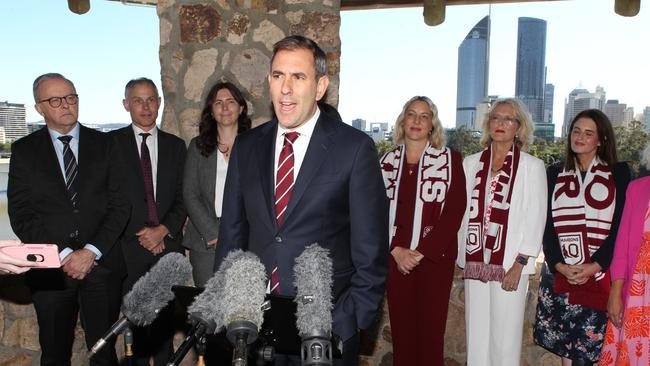Retired public servants prepare to fight over Chalmers’ super tax plan
The representative body for 700,000 retired public servants is preparing its case to overturn the plan to apply the new super tax on defined benefit pensions.

Business
Don't miss out on the headlines from Business. Followed categories will be added to My News.
Australia’s army of more than 700,000 retired public servants are escalating a push for a rejection of the new super tax.
As Jim Chalmers gets called out for allowing the Prime Minister and other top officials to be treated differently in paying the tax, the body representing retired public servants says it will now explore legal avenues to overturn the application of the tax to bureaucrats on Defined Benefits pensions.
Defined Benefits schemes remain the dominant form of super enjoyed by retired public servants – though the schemes were wound down in 2004. Under the terms of these schemes, the retiree gets a set payment due every year regardless of the fortunes of investment markets – even if there is a stock market crash, the incomes continue to be paid as scheduled.
In contrast, the majority of salaried workers are in ‘at-risk’ super funds, where future payments are highly dependent on the performance of investment markets.
According to the Australian Council of Public Sector Retiree Organisations, public servants defined benefits schemes should not be included in the tax net because to do so would not be in accordance with the objectives of the new legislation.
And in a second assault on the tax -which could trigger unexpected problems for the re-elected Albanese government – it says the tax would be ‘discriminatory’ in that it would ‘ apply a greater rate of tax to a woman than it would to a man who is the same age on the same income.’
‘We are looking to see legal avenues that we can pursue,’ says John Pauley, president of ACPSRO.
Public servants have become increasingly concerned about the tax as it applies to defined benefits as the government moves to lock in $2.3bn annually in expected revenue from the measure.
“The only people covering the public service issues here are ourselves,” he said.
The new super tax – which will be set at 15 per cent on earnings on amounts above $3m.
Under the plan, the government will tax the change in total super balance totals on all super funds over $3m – the totals will include both realised gains and – controversially – unrealised gains (also known as paper gains).
The Treasurer has said the new tax will apply to public servants defined benefit pensions. In order to bring DBs into the tax net, it is understood the tax will most commonly be applied by copying the existing family law calculations for settling defined benefit super disputes.
But public servant representatives argue that they should not come under their tax as they ‘are not in receipt of the several concessions that apply for funds accumulated under the Superannuation Guarantee arrangements and therefore should not be included within the ambit of the proposed legislation.’
As a recent correspondent to the Australian’s Money Puzzle podcasts suggested. “As an ADF member, I can’t restructure my affairs to avoid the new threshold or shift money into different investment vehicles. By contrast, presumably many of the 80,000 folks targeted by this tax are in accumulation funds or SMSFs that can at least try to manage their balances or adjust their strategies in anticipation.”
Separately, the sex discrimination case suggests that women living longer than men will consequently be paying more ongoing tax – whether they live to match actuarial assumptions or not. The objection was first raised by former High Court Justice Susan Crennan.
Though it is expected that many judges will be exempt from the new tax, under existing legislative protection, the principle of sex discrimination remains relevant since the early guidelines on the tax did not clearly define which public officials will be exempt from the tax.
Whatever final formula the Treasury adopts for the application of the new super tax to defined benefit funds, public servants – unlike super savers in conventional super funds – will not face the new tax until they retire.
In contrast, most investors who will be faced with the tax immediately, the new tax will have to be paid each year either by the person or by the person’s fund.
James Kirby hosts the twice-weekly Money Puzzle podcast
More Coverage
Originally published as Retired public servants prepare to fight over Chalmers’ super tax plan




